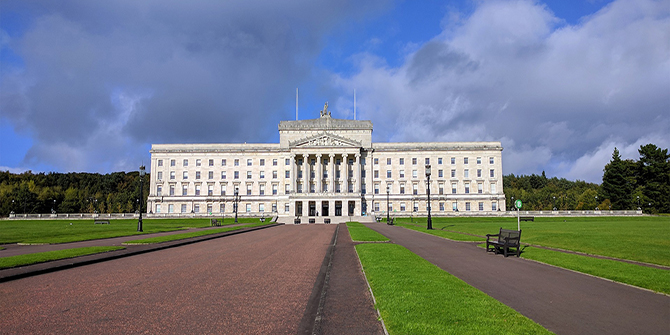 Joseph Ward demonstrates how through Brexit implementation, Theresa May’s government initiated a process of centralisation of both policy-making influence and administrative resources within Whitehall. These centralising tendencies have only been accelerated by the COVID-19 crisis under Johnson.
Joseph Ward demonstrates how through Brexit implementation, Theresa May’s government initiated a process of centralisation of both policy-making influence and administrative resources within Whitehall. These centralising tendencies have only been accelerated by the COVID-19 crisis under Johnson.
The immense impact of COVID-19 on British, and indeed global, politics makes it difficult to recall those issues that dominated the political landscape before it. Measures taken by Boris Johnson’s government such as the implementation of the furlough scheme and the extension of policing powers to enforce lockdowns at national and now local level(s), have led many commentators to express concern at the extension of central government powers.
Whilst it is clear that these centralising tendencies have been accelerated by the COVID-19 crisis, it is important to trace their origins and nature closely. In a recent article, I analyse the relationship between government management of Brexit and the centralisation of power in the executive, suggesting that from the May government onwards, Brexit implementation was used as a vehicle for government to reassert the power of the political centre. Drawing primarily on Institute for Government data, I demonstrate how in terms of both the policy-making influence of No. 10 and the size and budget of the civil service in Whitehall, this process took hold.
Executive dominance is by no means novel in the British political system. As scholars of the British Political Tradition have pointed out, traditionally British politics was seen to operate through the principle that a government with a majority in the Commons could govern without restraint. This so-called ‘power-hoarding’ model of democracy was limited to some extent by the reforms of the New Labour governments, such as devolution and the implementation of judicial review. However, others noted a paradox at the heart of Blair’s programme, with a simultaneous strengthening of the executive behind the implementation of reforms which appeared to devolve power.
The article is framed in relation to these debates, and draws on data over the period 2016-2019 concerning: (i) the makeup and focus of Cabinet committees; (ii) departmental structures and budgets; and (iii) resourcing and staff numbers within the civil service. Analysis of these criteria in relation to Brexit implementation reveals a process of state restructuring and centralisation.
In terms of policy influence, on taking office May decided to chair 48% of the Cabinet committees she attended, proportionally a much greater number than Cameron (35%). Though the 2017 general election result temporarily diminished this influence, towards the end of her premiership May once against chaired more committees than any other Cabinet member, including the Brexit committee and its two sub-committees, with the Europe Unit in No. 10 becoming the heart of negotiations.
In terms of staffing and resources, though the austerity measures of Cameron-Osborne ensured May inherited the smallest civil service since WWII, by 2019 one-fifth of the jobs cut from 2010-2016 had been replaced. These were predominantly located in government departments focused on Brexit, backed by £3.5bn of additional funding for Brexit preparation in 2018 alone.
In addition to internal centralisation, the May government emphasised the legitimacy of No. 10’s role in implementing the referendum result, and side-lined the role of parliament. In this vein, May initially attempted to use prerogative powers to trigger Article 50, with the legal case brought by Miller et al in early 2017 demonstrating the potential impact of judicial review on policy-making.
However, the manner in which May latterly sought to fuse the government with the original referendum mandate over the heads of parliamentarians was redolent of the ‘direct representation’ some democratic theorists have recently posited. May castigated and blamed MPs for the failure of the passage of the deal, questioning the legitimacy of those who contested her proposals. The increasingly fractious relationship between the executive and parliament saw the former frame the latter as a chamber of delegates obligated to vote through the deal, rather than one comprised of representatives elected to deliberate.
This approach towards parliament was accelerated in the early stages of the Johnson premiership, with the prorogation controversy last summer and the withdrawal of the whip from MPs who attempted block a No Deal Brexit in September 2019 providing evidence of their endurance. In terms of internal centralisation, Johnson appointed Michael Gove as Cabinet Office Minister and Chancellor of the Duchy of Lancaster, charged with coordinating No. 10’s agenda throughout government, with Brexit front-and-centre.
Indications from the COVID-19 period suggest these trends seem set to continue. In terms of parliamentary and party management, the failed attempt by No. 10 to parachute in Chris Grayling as chairman of the Intelligence and Security Committee and the attendant removal of the whip from Julian Lewis, provided a particularly prominent example.
In terms of shifts within Whitehall, the resignation of Mark Sedwill and appointment of David Frost as national security advisor suggests a willingness to politicise the recruitment of officials. On public health and the NHS, proposals to reassert the powers of the Health Secretary and to ‘clip the wings’ of NHS England, as well as plans to incorporate social care into the NHS, presage the return of control of much public health policy to central government. More recently, similar curtailments are said to have been proposed for the London Mayoralty, another position open to capture by oppositional political forces, and which Margaret Thatcher sought to address in the 1980s. As has been noted by legal scholars, a project to restore and extend the powers of the executive appears to motivate these measures.
Evidence from the first year of the Johnson government, therefore, indicates that whilst Brexit provided the initial context for these measures, centralisation of power and policy-making influence looks set to be a prominent feature of British politics for the foreseeable future. The ease with which the Johnson government has reasserted these tenets of governing is arguably testament to a lack of fundamental change to Britain’s political institutions, despite the reforms of the New Labour and Coalition governments. However, as the recent exams scandal has exposed, such an extension of control can incur political costs, with the diminished role of arms-length organisations making it more difficult to off-hand the blame when things go wrong. This may yet lead Johnson to reconsider his approach, given the myriad difficulties which have so far beset his administration.
_____________________
Note: the above draws on the author’s published work in Parliamentary Affairs.
 Joseph Ward (@JWard232) is a Doctoral Researcher in POLSIS at the University of Birmingham.
Joseph Ward (@JWard232) is a Doctoral Researcher in POLSIS at the University of Birmingham.
“Boris Johnson Bresxit Day” by UK Prime Minister is licensed under CC BY-NC-ND 2.0








While there was undoubtedly an attempt to bring greater central control to decision-making, particularly on EU exit, under Mrs May, I’d argue (having worked on the ‘inside’) that it was a largely unsuccessful attempt. Huge amounts of effort were invested in departmental co-ordination, but they largely failed. And while Mrs May attempted to circumvent parliament, she also failed in that, leading ultimately to her removal by parliament (albeit only by Conservative members). Indeed, to give her credit, she ended up spending proportionately more time at the despatch box than, I believe, any other PM in history. Mr Johnson is certainly attempting to centralise power in the hands of No.10, especially through his network of special advisers. However, when he, in turn, is removed by his colleagues in parliament in a year or two I expect to see a reaction against No10 centralisation and much greater department autonomy under his successor.